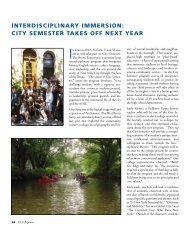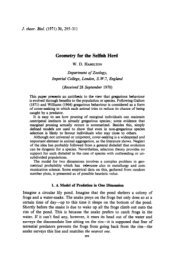Chapter 6 - Ethical Culture Fieldston School
Chapter 6 - Ethical Culture Fieldston School
Chapter 6 - Ethical Culture Fieldston School
You also want an ePaper? Increase the reach of your titles
YUMPU automatically turns print PDFs into web optimized ePapers that Google loves.
“Mr. Sinatra Gets Rejected”<br />
“Next time I see you, I’ll kill you, you degenerate!” he allegedly said. Mortimer<br />
had Sinatra arrested, and sued him for $25,000. Sinatra claimed Mortimer had<br />
called him a “dago,” but under pressure from MGM studio chief Louis B. Mayer,<br />
he retracted that allegation and settled out of court. Though he would later atone<br />
for the act by paying a visit to William Randolph Hearst himself, Sinatra would<br />
be viewed for the rest of his life as a man prone to resort to violence when he felt<br />
he was crossed – a perception that would only be augmented in barely concealed<br />
incidents that would continue to surface in the media for decades to come. 31<br />
But Sinatra’s biggest offense against a public he had so assiduously<br />
cultivated was probably his now‐legendary love affair with Ava Gardner. Sinatra<br />
had married Nancy Barbato in 1939, and she had borne him a daughter the<br />
following year who figured prominently in shaping his public image as a<br />
husband and father. In truth, of course, Sinatra had never been a traditional<br />
family man, not only because a mid‐century celebrity lifestyle largely foreclosed<br />
that possibility, but also because it was a more‐or‐less open secret that Sinatra<br />
was a notorious womanizer (in the memorable words of Dean Martin, “When<br />
Sinatra dies, they’re giving his zipper to the Smithsonian.”). 32 For the most part,<br />
however, Sinatra kept his sexual activity from the prying eyes of gossip<br />
columnists.<br />
Ava Gardner, however, was different. By most accounts, she was truly the<br />
love of his life. Moreover, the thrice‐married Gardner was something of a larger‐<br />
than‐life figure herself who was not always inclined to discretion even when<br />
Sinatra was (there’s a salty edge to her 1992 autobiography that distinguishes it<br />
30 Kelly, p. 134 [try to find original]<br />
31 Sinatra’s assault on Mortimer has been widely recounted; I’ve relied principally on Wilson, pp. 69-76<br />
and Taraborelli, pp. 92-95. Kitty Kelly based her knowledge of a Sinatra-Hearst meeting on an interview<br />
with Hearst’s grandson John Hearst. See My Way, pp. 139-140; 575. Years later, a drunken Sinatra found<br />
Mortimer’s grave and urinated on it. See Lahr, p. 43<br />
American History for Cynical Beginners<br />
27
















